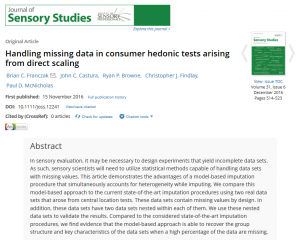Handling missing data in consumer hedonic tests arising from direct scaling
 In sensory evaluation, it may be necessary to design experiments that yield incomplete data sets. As such, sensory scientists will need to utilize statistical methods capable of handling data sets with missing values. This article demonstrates the advantages of a model-based imputation procedure that simultaneously accounts for heterogeneity while imputing.
In sensory evaluation, it may be necessary to design experiments that yield incomplete data sets. As such, sensory scientists will need to utilize statistical methods capable of handling data sets with missing values. This article demonstrates the advantages of a model-based imputation procedure that simultaneously accounts for heterogeneity while imputing.
We compare this model-based approach to the current state-of-the-art imputation procedures using two real data sets that arose from central location tests. These data sets contain missing values by design. In addition, these data sets have two data sets nested within each of them. We use these nested data sets to validate the results. Compared to the considered state-of-the-art imputation procedures, we find evidence that the model-based approach is able to recover the group structure and key characteristics of the data sets when a high percentage of the data are missing.
Practical Implications
The model-based imputation procedure presented in this manuscript is used to analyse incomplete multivariate data sets arising from central location tests. It can be used to analyse incomplete mulitvariate data sets where there is correlation among the variables. Examples include data arising from high fatigue studies, just-about-right scale, free choice profiling, or from the ideal profile method.
![]()
Franczak, B. C., Castura, J. C., Browne, R. P., Findlay, C. J., & McNicholas, P. D. (2016). Handling missing data in consumer hedonic tests arising from direct scaling. Journal of Sensory Studies, 31, 514–523. http://dx.doi.org/10.1111/joss.12241